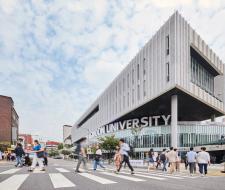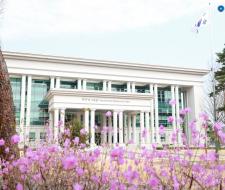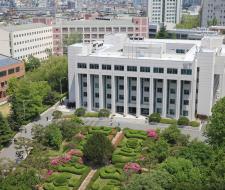Language courses in South Korea for international students
- Language Courses in South Korea for International Students
- Language School Programs in South Korea
- Language courses in South Korea fees
- Top Language Schools in South Korea
- Advantages of Studying in South Korea
- Korean Language Courses for Adults in South Korea: General Information
- Language Studies in South Korea
- General Korean Language Courses
- Preparation for TOPIK Exams
- Korean Language Courses for Adults in South Korea: Tuition Fees
- Admission Requirements in South Korea
- Literature and references
This content was developed and approved with active participation of Laura Galindo, who is a Marketing Director in OHLA Miami Language School.
In the process of preparing the material, we referenced the following sources:
- https://education.forbes.ru/special-projects/south-korea/tpost/zxbg0kb191-yazikovie-kursi-v-yuzhnoi-koree
- https://thekoreanguide.com/why-is-english-not-taught-in-korea/
-

-
 from 840.00 $ / 3 months
from 840.00 $ / 3 months -
 from 875.00 € / 5 months
from 875.00 € / 5 months -
 from 1030.00 $ / semester
from 1030.00 $ / semester -
 from 1070.00 $ / semester
from 1070.00 $ / semester -
 from 905.00 $ / 10 weeks
from 905.00 $ / 10 weeks -
 from 980.00 $ / semester
from 980.00 $ / semester -
 from 1470.00 $ / semester
from 1470.00 $ / semester -

-
 from 208.00 $ / week
from 208.00 $ / week
English language schools in South Korea are in well-deserved demand. This country is featured by a high level of security and cleanliness. While studying, foreign students are immersed in Asian culture, architecture, customs. In South Korean language school, the foreign students are provided with the opportunity to study Korean and English.
Excellent organization of recreation, the best conditions of accommodation and food, the most interesting excursion programs, the opportunity to start studying or improve your knowledge of Korean, English – not all the advantages of choosing a camp in this country.
Language schools in Korea with foreign language learning programs are a great opportunity for a child to improve their knowledge and communication skills, significantly expand their vocabulary, and get serious motivation for further education in a relaxed, fun atmosphere of games, excursions, activities and entertainment.
Alternative destinations
Language Courses in South Korea for International Students
South Korea provides an array of language courses, allowing students to get acquainted with Korean culture and improve language skills.
Benefits of Language Courses in South Korea
-
Affordability: A weekly language course typically costs around 196 USD, and a month's stay in a studio apartment can be around 359 USD.
-
University-Linked Courses: Most language schools are affiliated with universities, granting students access to facilities like libraries and sports centers. Completing these courses often earns a certificate, beneficial for university admission.
-
Admission Requirements: No prior Korean language knowledge is required, with secondary education being sufficient for enrollment.
-
Visa Extension Opportunity: Successful completion of university language programs allows students to extend their visas within South Korea.
-
Cultural Richness: South Korea's rich heritage, including 15 UNESCO sites, and vibrant modern entertainment industry, provides a dynamic learning environment.
Language School Programs in South Korea
-
Program Age Range: Designed for students aged 13-17, perfect for fostering independence under supervision.
-
Bilingual Courses: Most courses offer instruction in both Korean and English.
-
Program Types:
-
Standard Courses: Focus solely on language learning, varying in intensity and duration.
-
Specialized Courses: Include TOPIK exam preparation, university pathway programs, and specific skills like conversation and pronunciation.
-
Teen Summer Courses: Incorporate daily Korean lessons, accommodation, meals, and cultural events.
-
Educational Structure and Cultural Engagement
-
Academic Progression: Requires 80-90% class attendance and a minimum of 70% on tests to advance.
-
Practical Language Skills: Emphasis on speaking, reading, writing, and listening.
-
Cultural Activities: Martial arts, traditional music, Korean cuisine, and K-pop classes.

At what age do foreign students usually enter English schools?
Our programs are for ages 16+. Nonetheless, the average age of our student population is between the ages of 18-35.
Language courses in South Korea fees
On average, the tuition fees amount to $1,000 per week, covering curriculum and accommodation. Additional costs may arise from excursions and recreational activities.
Application Requirements for Korean Language Schools
Typical documentation includes a child’s passport, notarized parental consent, birth certificate, and medical certificates, with specific requirements provided by the school.
Top Language Schools in South Korea
-
SNU KLEC at Seoul National University: Offers a variety of programs including summer classes and evening lessons, with extracurricular activities like Taekwondo. The average semester cost with accommodation is 1,907 USD.
-
Lexis Korea: Located in Seoul and Busan, this school provides standard courses, TOPIC preparation, summer camps, and individual classes, with cultural classes on Korean cuisine and etiquette. Collaboration with universities like Konkuk, Hanyang, and Sejong allows enrollment without a TOEIC exam for students who achieve the necessary language level. The average weekly study cost without accommodation is 255 USD.
Advantages of Studying in South Korea
- Worldwide popularity of rich Korean culture,
- Government support programs for international students,
- A large number of educational institutions,
- A promising future and world-class technology,
- High quality of life,
- Employment guarantees and career growth opportunities.
Korean Language Courses for Adults in South Korea: General Information
Korean language courses are available at Korean language centers in most national and private universities across the country or in private language schools. Enrollment in a university language center is the most preferred option for most international students who intend to pursue higher education in South Korea. Students in these courses receive 15-25 hours of language instruction per week, depending on the chosen program. Applicants must have completed secondary education. University-based courses enroll students four times a year, while private language centers accept new students every Monday.
A university Korean language program typically consists of four semesters and starts every three months (or 10 weeks). Short-term courses are also available during holidays, lasting 3 or 6 weeks. Most courses are designed for adult students and those aged 16 and older. Special activities are organized for these students, allowing them to visit local attractions during their free time. Many private language schools offer an extended program that helps students explore various aspects of Korean culture.
General Admission Period for Korean Universities:
- For the spring semester, applications are accepted from September to November,
- For the fall semester, an applicant can enter from May to June.
The exact application period may vary depending on the chosen university. Students admitted to programs are eligible to apply for a general short-term visa (C-3) or a general student visa (D-4). For short-term programs (up to six months), a visa is not required.
Language Studies in South Korea
Foreign students are provided with a wide range of courses, including regular programs, evening classes, individual lessons, and summer courses of various durations.
There are several levels of Korean language study:
- Beginner 1A — designed for students who are encountering Korean for the first time. It includes the study of characters, phonetics, and syllable structure. Students learn to understand basic words and simple sentences and practice conversational skills.
- Beginner Level 1 — builds on the A1 program by adding the study of basic sentence structures needed for everyday life. Students greet each other in Korean, talk about themselves, and practice skills through role-playing.
- Elementary — focuses on accurate pronunciation and the development of more complex conversational skills. Lessons include simulations of situations in banks, hotels, and post offices.
- Intermediate 1 — significantly expands vocabulary, introduces complex words, and teaches students to engage in conversations and understand daily announcements, weather forecasts, and advertisements.
- Intermediate 2 — a more advanced level that includes understanding the country's culture, proverbs, and terminology.
- Advanced 1 — covers idioms and loanwords. Students learn to read literature in Korean independently and discuss political and economic news.
- Advanced 2 — includes a broader vocabulary, local slang, and abbreviations. Students at this level can enroll in educational institutions or seek employment.
- Immersion Class — at this level, students receive effective preparation for admission to Korean universities for undergraduate, master's, and doctoral programs. The educational process stipulates advanced vocabulary, grammar, reading and translating books, listening, and writing skills.
Some Korean universities offer courses taught in English. Additionally, a variety of other languages can be studied in South Korea, including:
- English,
- Japanese,
- Chinese,
- Vietnamese,
- Russian,
- Mongolian.
General Korean Language Courses
Standard language courses for adults are presented in a variety of options, taking into account students' free time, needs and financial possibilities:
- General Korean - The course is tailored for students who have various levels of language knowledge and are interested in improving their skills. There are 12 weekly lessons where students learn all aspects of Korean: speaking, listening, reading, writing, grammar and vocabulary enrichment.
- Learning Korean + experiencing the culture of the country. During the course, students will study the language and spend their free time learning about the history and traditions of South Korea. Additionally, doramas and K-Pop, for example, are used as study material. There are also excursions and other activities during which students will be fully immersed in Korean culture.
- Evening and Weekend Courses - Designed for students and working people who want to improve their Korean skills at a relaxed pace. Consists of standard topics - listening, reading, writing, and practical writing assignments.
- Intensive Korean (full-time) - includes 15 weekly lessons of 60 minutes each. Students learn and practice basic Korean language skills in the first half of the day, and in the second half of the day they practice in optional classes: learn to write letters, discuss news, and debate on various topics.
- Individualized classes - are paced according to students' starting level, needs and goals. Students can focus on their personal goal of conversational Korean, college admission, or translation skills. Additionally, a combination of private lessons and group classes is available for those who wish to do so.
The minimal duration of studying at language schools is1 week. The number of students in one group does not exceed 10-15 persons. The beginning of study is possible at any session, but before you start you have to pass an entrance test in order to be able to assign students to levels according to their knowledge of the language. Upon completing studies, a certificate is issued. All teachers are native speakers of Korean, have higher education and other necessary qualifications, and have experience working with foreign students.
Preparation for TOPIK Exams
The Test of Proficiency in Korean (TOPIK) is required for all students, as it allows them to confirm their language knowledge and to enter Korean universities.The target audience is non-native speakers. The National Institute for International Education is responsible for its conduct. To take the test is possible six times a year —in January, March, April, July, October, and November. The exact schedule is published at the beginning of each year on the official TOPIK website. Exam scores are considered during university admissions and when seeking employment in Korean companies.
The levels of Korean language proficiency for the exam are divided into two parts:
- Beginner — Levels 1 and 2,
- Advanced — Levels 3 to 6.
The course program includes studying academic Korean, practicing exam materials, developing test-taking strategies, and enhancing critical thinking. For students studying in Korea on exchange programs, with support from their home country, or who are professional athletes or artists, the TOPIK requirements may be reduced.
Students improve their skills through mock tests with highly qualified native Korean teachers, identifying and correcting weak areas to achieve high scores.
The duration of courses ranges from 3 to 52 weeks, with 25 lessons per week. In private language centers, students can join at any time, starting every Monday, while university language centers offer enrollment several times a year. Before admission, applicants undergo a preliminary assessment to ensure proper placement in groups.
The TOPIK exam for the beginner level lasts about 2 hours, while the advanced level, which includes both oral and written sections, lasts 3 hours. The test consists of multiple-choice questions. To pass, the beginner level requires a score of at least 140 points, while the advanced level requires at least 230 points.
Korean Language Courses for Adults in South Korea: Tuition Fees
The final cost largely depends on the location of the educational institution—whether it's in a major city or the suburbs, its prestige, as well as the duration of the study. The cost of university-based courses is as follows:
- General Korean: 3 weeks — from $900, 10 weeks — from $1,400,
- Preparation for the Test of Proficiency in Korean (TOPIK) — from $3,000 per course.
Additionally, there will be extra expenses for:
- Registration fee — from $150,
- Accommodation,
- Meals,
- Health insurance,
- Public transportation,
- Internet access,
- Study materials,
- Transfers.
Admission Requirements in South Korea
The requirements vary depending on the university you have chosen. It is necessary to provide a following package of standard documents:
- Completed application form,
- Copy of the passport,
- Photographs,
- Written confirmation of enrollment in the course,
- Bank statement as proof of financial independence,
- Study plan.
After completing the application form and having the documents reviewed, applicants must pay the course fee, wait for approval from the educational institution, and then begin the process of obtaining a student visa.
